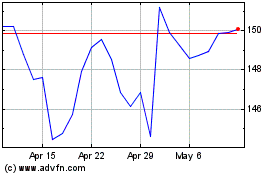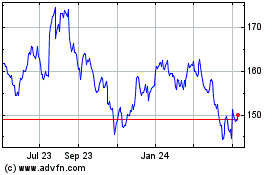Johnson & Johnson Pulls Out of Talks to Buy Actelion -- Update
December 13 2016 - 8:42PM
Dow Jones News
By Jonathan D. Rockoff and Dana Mattioli
Johnson & Johnson pulled out of talks to buy Swiss drug
company Actelion Pharmaceuticals Ltd. after the price needed to
seal the deal got too high.
New Brunswick, N.J.,-based J&J issued a statement Tuesday
evening saying it had ended talks after the companies confirmed
J&J's approach last month.
In its own statement, Actelion said it's "engaged in discussions
with another party regarding a possible strategic transaction."
It isn't clear exactly what price the two sides discussed, but
should they have reached a deal it was expected to be valued at as
much as $30 billion. Actelion currently has a market value just
above $22 billion after its shares ran up on expectations of a
takeover.
At that level, a deal would have eclipsed J&J's biggest to
date, the $21 billion acquisition of trauma-device maker Synthes
Inc. in 2011.
J&J decided the price was too high to make the kind of
return the health-products company expects on a deal, a person
familiar with the matter said.
"Johnson & Johnson was not able to reach an agreement that
it believed would create adequate value for its shareholders," the
company said in its statement.
It isn't clear whether other suitors are still circling
Actelion.
J&J had been pursuing Actelion because its portfolio of
rare-disease drugs would have helped the health-products giant
overcome low-priced competition for its top-selling drug Remicade.
Actelion has a specialty in the treatment of pulmonary arterial
hypertension.
Last year, Actelion reported revenue of 2.05 billion Swiss
francs ($2.03 billion) and a profit of 551.9 million francs.
With a market value of more than $300 billion and about $40
billion in cash, J&J had the financial firepower to do a
deal.
But Chief Executive Alex Gorsky and Chief Financial Officer
Dominic Caruso have said they would not overpay for
acquisitions.
J&J lost out in an auction of Pharmacyclics, a cancer-drug
company that AbbVie Inc. ended up buying last year for $21
billion.
Actelion was an imperfect fit for J&J, which doesn't have a
franchise selling rare-disease drugs, like some other big
pharmaceutical companies do.
It isn't the first time lately that a bid to seal a big drug
merger has fallen apart.
There have been more than $250 billion of health care deals
announced so far in 2016, according to Dealogic, down from a total
of more than $500 billion in all of 2015. Last year's tally would
have been even greater if Pfizer's roughly $150 billion agreement
to buy drugmaker Allergan PLC hadn't fallen apart amid resistance
from the Obama administration. The deal was to be a so-called
inversion, moving Pfizer abroad for tax purposes. Indeed,
resistance in Washington is one factor cited by deal makers for the
drop in merger activity in 2016.
Write to Jonathan D. Rockoff at Jonathan.Rockoff@wsj.com and
Dana Mattioli at dana.mattioli@wsj.com
(END) Dow Jones Newswires
December 13, 2016 20:27 ET (01:27 GMT)
Copyright (c) 2016 Dow Jones & Company, Inc.
Johnson and Johnson (NYSE:JNJ)
Historical Stock Chart
From Mar 2024 to Apr 2024

Johnson and Johnson (NYSE:JNJ)
Historical Stock Chart
From Apr 2023 to Apr 2024
